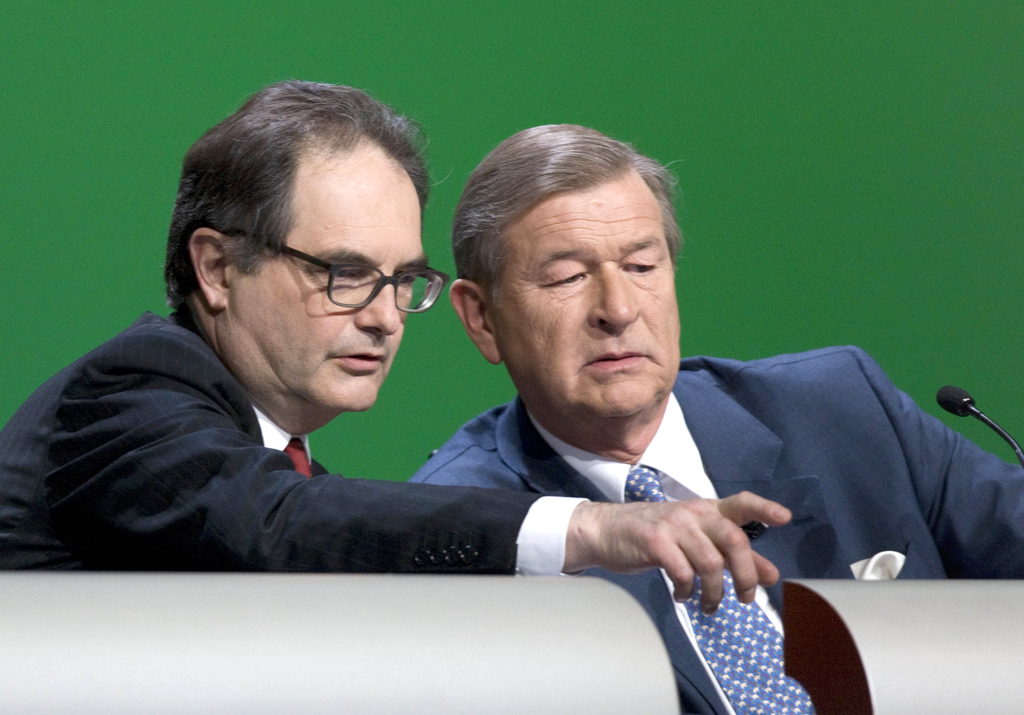Legal action at UBS seen as “unlikely”

The vote by shareholders of Swiss bank UBS not to absolve their 2007 management of any blame for losses is unikely to lead to a legal case, a banking expert says.
But Peter V. Kunz, a professor of economic law at Bern University told swissinfo.ch that Wednesday’s vote against the so-called discharge, usually a routine affair at annual general meetings, nevertheless has certain implications.
The vote against – 52.8 per cent – has been widely interpreted as a strong signal of disapproval by the shareholders. UBS chairman Kaspar Villiger admitted that it was a “clear sign of dissatisfaction”.
In a separate non-binding vote, almost 40 per cent of shareholders opposed the bank’s bonus plan for 2009. Compensation at big companies, particularly major banks, has come under close public scrutiny in Switzerland and is the subject of a people’s initiative aimed at curbing excesses.
swissinfo.ch: Shareholders voted on Wednesday against absolving the 2007 UBS management of potential blame for losses incurred in the financial crisis. How significant was that?
Peter V. Kunz: Overall it was a historic result for Swiss public companies. Never before has a public company in this way said “no” to a vote for discharge. On the other hand you must see that it is limited to the business year 2007. The years 2008 and 2009 were accepted by the shareholders. I think the primary significance is [therefore] more symbolic than legal.
swissinfo.ch: What is the likelihood that this vote will now lead to a legal case against former UBS bosses?
P.V.K.: We will see what, if anything, the board decides, but in my view it is rather unlikely that anything will happen. I don’t see a legal case coming. UBS made it clear, and for the most part shareholders agreed, that they want to look to the future; liability actions always look into the past.
swissinfo.ch: Does the vote have anything other than a symbolic meaning?
P.V.K.: Yes, there are certain legal implications. First, UBS may file an action – I stress may file and not must file – because with a discharge UBS wouldn’t have had chance to file such action. The second is that the shareholders can now also file lawsuits against the board members and the management of the year 2007 without any time pressure. If there had been a discharge, shareholders would have needed to file a lawsuit within six months. This time pressure is now not there. The only threshold they must be careful about is the statute of limitations and this is five years.
swissinfo.ch: Can the board of directors simply sweep the matter under the carpet now?
P.V.K.: I think the primary legal obligation for the board now is to reconsider its decision of December 2009 not to file a lawsuit. I think Wednesday’s resolution by the shareholders gives the board a legal obligation to do that. But reconsidering doesn’t mean that they really have to file a lawsuit. On the other hand, it might be a good decision that the board puts the issue of filing legal action on the next agenda of an annual general meeting.
swissinfo.ch: What effects are there likely to be on the rest of the Swiss banking industry?
P.V.K.: I think we have to make a distinction. Wednesday’s resolution not to grant a discharge probably has no wider implication for the banking industry in Switzerland. I think this resolution was really UBS-specific. Nothing like that is an issue, for instance, with Credit Suisse and other major banks.
However, a resolution was taken on Wednesday about the compensation policy of UBS. You have seen that even though it was not a binding resolution – only a consultative vote – about 40 per cent of the shareholders said “no”. I think this is a clear indication not only to the board of UBS but also to the boards of other financial institutions that they should be rather careful when it comes to compensation policies. This particular resolution has a certain preventive effect for the banking industry.
swissinfo.ch: How about outside Switzerland? Does anyone else really care?
P.V.K.: Apparently so. It was front page news in Thursday’s Financial Times, for instance, so the international media is really taking a close look at UBS. It is one of the global players in the banking industry, in particular in the wealth management business, and so it is quite clear that the international community is looking at what happening at UBS. However, Wednesday’s vote is in my view not a weakening of UBS but rather a strengthening because the shareholders showed that they are really behind the company. It was not a vote against the company but against the former board members who left two years ago.
swissinfo.ch: What lessons, if any, should be learned from all this?
P.V.K.: I think we can broaden Wednesday’s result not granting the discharge. If you like, it’s a “watch out” signal. Scrutiny of the work of board members and managers has intensified and they cannot be sure that shareholders will only say “yes” and that’s the end of the matter.
Robert Brookes, swissinfo.ch
“UBS can’t shake off its past” – headline of The Wall Street Journal
“UBS shareholders delivered a startling rebuke to its board and management yesterday when a majority of them voted against absolving former top executives widely identified with its problems in the credit crisis.” – Financial Times
“Cheers erupted at a Basel meeting hall as UBS shareholders won a vote to keep in place the threat of civil action against members of the board who served in 2007, the year the Swiss bank first announced several billions of pounds of losses.” – Daily Telegraph
“UBS shareholders showed their frustration over bank bonuses Wednesday, with far fewer than usual voting at the annual shareholders’ meeting to back last year’s compensation decisions.” – New York Times
The shareholder activist foundation is calling on UBS to file a civil lawsuit against its former executives after Wednesday’s vote.
Ethos says the 2007 discharge concerns in particular Marcel Ospel, Peter Kurer, Peter Wuffli and Marcel Rohner who were in office at that time and, it claims, were mainly responsible for the enormous losses incurred by the bank through speculative operations in the United States subprime real estate market, as well as to the non respect of US tax laws.
Ethos director Dominique Biedermann says: “We now ask the board to reconsider their decision and file a civil lawsuit against the former members of the board and executive management, sending a clear signal that the board is distancing itself from the acts of their predecessors.”
“This is a necessary step toward regaining the confidence of UBS clients and shareholders to restore the Bank’s strong financial position.”

In compliance with the JTI standards
More: SWI swissinfo.ch certified by the Journalism Trust Initiative













You can find an overview of ongoing debates with our journalists here . Please join us!
If you want to start a conversation about a topic raised in this article or want to report factual errors, email us at english@swissinfo.ch.